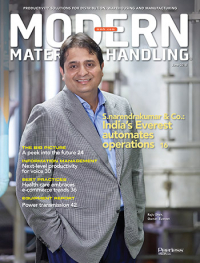60 Seconds with Kent Savage, Apex Supply Chain Technologies
Modern spends 60 seconds talking with Kent Savage, founder and CEO at Apex Supply Chain Technologies, about the evolution of the materials handling industry and birth of Apex.
Modern: We’re celebrating the 25th anniversary of the first patent for industrial vending technology, which I’m told was issued to you on April 27, 1993. What was the state of the industry before industrial vending?
Savage: My background was in traditional vending, like food and beverage machines, and we started exploring how computers could be used for the transaction rather than putting money into a machine. That got us to looking into manufacturing, where we discovered a lot of inefficiencies.
We began by looking at the tool crib in auto manufacturing. Before industrial vending, if a worker needed a tool, they would leave their workstation and go to the tool crib where another employee would get one from a shelf. Industrial vending automates these transactions.
The technology allows us to decentralize tools and other critical supplies. Now, the worker doesn’t have to leave their workstation. Every transaction is recorded to ensure a supplier is notified to replenish the device when a pre-set level is reached.
This ensures the device never runs out of materials. A comparable analogy for this technology is an ATM. We used to go to the bank teller, and now we go to more conveniently located, self-serve ATM. The technology is helping streamline the supply chain.
Modern: Was there an a-ha moment that led to your working on this idea?
Savage: In 1987, I went to Japan where I was introduced to Lean manufacturing. I got the idea of using a computer to control the machine, and I asked, what would you put in the machine? My thinking then was that the value of the system would be driven by the value of what’s in it, so the first application was for cutting tools used in auto plants. A carbide insert the size of your thumbnail can cost $100. We floated the idea to the auto industry, and they said “yes.”
Modern: How did the first prototype come about?
Savage: The interest came from Ford. I spent about two years going into plants to get input from everyone from the UAW workers on the shop floor to management to procurement to production engineers. The first installation was in a Ford power train plant in Ohio around 1990, before my first patent was issued. Then, as people worked with the early machines and software, we improved them.
Modern: You mentioned using computers for the transactions. Were the first machines networked?
Savage: In those days, we didn’t have networks or the Internet. Each machine was cabled to servers on site. In some cases, we had to run cable half a mile through the plant. The technology was supposed to be good for 4,000 feet, and sometimes we used repeaters to run the cable further.
Workers swiped a card to authorize transactions. We had to dial in to the system to check inventory status. As network computing evolved and the Internet became pratical, we embraced those technologies. In a sense, we were in the Cloud before there was a Cloud.
Modern: How did Apex Supply Chain Technologies come about?
Savage: After selling my previous company, I looked at the industry and realized there had been some success, but I wondered why it hadn’t grown faster. I came up with three answers: The technology was too hard too use, too hard to implement and too expensive. I knew if we could address those three things we could do a lot. That led to Apex, which we founded in 2006 to build the next generation of the industrial vending machine.
Modern: How has the industry evolved since that first patent?
Savage: In the beginning, the technology was met with a lot of resistance. People asked “why we would ever want to do that?” As the cost came down, we broadened the use cases. While dispensing consumables, PPE and other items, we’ve applied the technology to many different applications and industries. Apex now has more than 100,000 devices deployed across the globe recording billions of transactions.
The technology evolved to become a best practice. When global companies open a new facility, it’s almost expected that industrial vending will be implemented. And, it’s in part because we’ve been able to make it easy to use, easy to implement and easy to afford.

Article Topics
Columns News & Resources
New resource center for weighing and dimensioning Protective packaging roundup MODEX C-Suite Q&A: Troy Donnelly, Senior VP of Sales, Marketing, and Application, DMW&H When Just-in-Time Just Doesn’t Work Recycling coastline plastic into premium reusable packaging Fresh food, anyone? RPCs protect in the supply chain Why Isn’t Your Loading Dock Connected to Your Supply Chain? More ColumnsLatest in Materials Handling
Geek+ and System Teknik deploy PopPick solution for pharmacy group Med24.dk Beckhoff USA opens new office in Austin, Texas Manhattan Associates selects TeamViewer as partner for warehouse vision picking ASME Foundation wins grant for technical workforce development The (Not So) Secret Weapons: How Key Cabinets and Asset Management Lockers Are Changing Supply Chain Operations MODEX C-Suite Interview with Harold Vanasse: The perfect blend of automation and sustainability Consultant and industry leader John M. Hill passes on at age 86 More Materials HandlingSubscribe to Materials Handling Magazine

Find out what the world's most innovative companies are doing to improve productivity in their plants and distribution centers.
Start your FREE subscription today.
April 2024 Modern Materials Handling

Latest Resources












